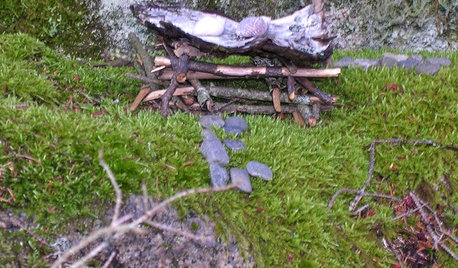difference between organic and holistic?
13 years ago
Related Stories

ROOTS OF STYLEArt Deco, Art Nouveau, Arts and Crafts: What’s the Difference?
If the zigzag and swirly designs of the past leave your head spinning, these descriptions will straighten you right out
Full Story
DECORATING GUIDESStaging vs. Decorating: What's the Difference?
Unlike decorating, staging your home isn't about personal style — it's about creating ambiance and appeal for buyers
Full Story
DECORATING GUIDESChevron, Herringbone, Flame Stitch: What’s the Difference?
Make the right point by learning the differences among these 3 popular zigzag patterns
Full Story
HOUZZ TOURSMy Houzz: Eclectic Meets Rustic in a Decidedly Different Dallas Home
This couple's highly personal style embraces found objects, thrift store scores, international art and a whole lotta grandkid love
Full Story
REMODELING GUIDESCarrara vs. Calacatta Marble: What Is the Difference?
The answer is in the color and veining of these popular Italian marbles
Full Story
FUN HOUZZSomething a Little Different: Fairy Houses
Miniature abodes crafted for otherworldly creatures capture the imagination
Full Story
LIFEYou Said It: ‘It’s Different ... But Then, Aren’t You?’ and More Wisdom
Highlights from the week include celebrating individuality and cutting ourselves some decorating slack
Full Story
MOST POPULAR8 Little Remodeling Touches That Make a Big Difference
Make your life easier while making your home nicer, with these design details you'll really appreciate
Full Story
MOST POPULARSee the Difference a New Back Deck Can Make
A dramatic 2-story porch becomes the centerpiece of this Ohio family’s renovated landscape
Full Story
HOMES AROUND THE WORLDHouzz Tour: Open-Plan Design Makes All the Difference
The owners of a narrow cottage near Sydney revamp their home’s layout, adding flexibility and modernity on a budget
Full StoryMore Discussions










rhizo_1 (North AL) zone 7
riley17Original Author
Related Professionals
Wrentham Landscape Architects & Landscape Designers · Tempe Landscape Contractors · Concord Landscape Contractors · Danvers Landscape Contractors · Lake Zurich Landscape Contractors · Mastic Beach Landscape Contractors · Mission Viejo Landscape Contractors · Woodburn Landscape Contractors · Chicago Ridge Landscape Contractors · Kingsburg Landscape Contractors · Centennial Decks, Patios & Outdoor Enclosures · Lacey Decks, Patios & Outdoor Enclosures · Markham Decks, Patios & Outdoor Enclosures · Royal Oak Decks, Patios & Outdoor Enclosures · West Chicago Decks, Patios & Outdoor EnclosuresDan _Staley (5b Sunset 2B AHS 7)
tapla (mid-Michigan, USDA z5b-6a)
riley17Original Author
Kimmsr
DrHorticulture_
organicdan
Dan _Staley (5b Sunset 2B AHS 7)
tapla (mid-Michigan, USDA z5b-6a)
sun87